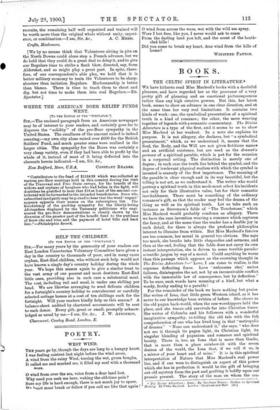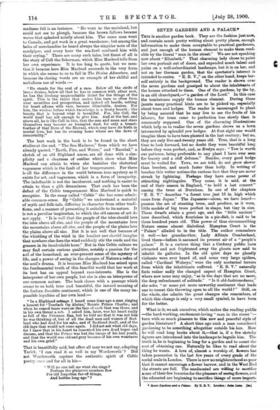BOOKS.
THE CELTIC SPIRIT IN LITERATURE.*
WE have hitherto read Miss Macleod's books with a doubtful pleasure, and have regarded her as the possessor of a very pretty gift of phrasing and an emotional picturesqueness rather than any high creative powers. But this, her latest book, seems to show an advance in one clear direction, and at the same time her very real limitations. It contains two kinds of work: one, the symbolical presentation of a spiritual truth in a kind of romance ; the other, the mere weaving together of legends with a romantic commentary. The Divine Adventure is a type of the first, and it seems to us to show Miss Macleod at her weakest. In a note she explains its purpose. It is not allegory, she declares, but "a symbolical presentment," which, as we understand it, means that the Soul, the Body, and the Will are not given fictitious names and an artificial existence, but are used as the dramatis persona of a spiritual parable, which is put for the occasion in a corporeal setting. The distinction is merely one of degree ; in each case the truth lies behind the symbol, and the degree of irrelevant physical realism with which the symbol is invested is scarcely of the first importance. The meaning of the parable is clear enough and in its way beautiful, but the telling is not art, as we understand it. The writer who would portray a spiritual truth in this mode must select his incidents not only for their illustrative value, but for their romantic inevitableness. There must be something of the ordinary romancer's gift, so that the reader may feel the drama of the thing as well as its spiritual truth. Let us take such an instance as Stevenson's fable of "The Touchstone," which Miss Macleod would probably condemn as allegory. There we have the sure invention weaving a romance which captures the fancy, and at the same time the reader has a double joy in each detail, for there is always the profound philosophic, interest to illumine from within. But Miss Macleod's fancies are too common, her moral in general too obvious. She says too much, she breaks into little rhapsodies and sermons, and then at the end, feeling that the fable does not carry its own instant interpretation, she is driven to some terrible pseudo- scientific jargon by way of a moral. Could anything be worse than this passage which appears as the crowning thought in The Divine Adventure ?—" Love, I am come to realise, is the supreme deflecting force. Love 'unloosens sins,' unites failures, disintegrates the act, not by an inconceivable conflict with the immutable law of consequence, but by deflection." To be sure, such words have meaning of a kind, but what a wordy, frothy ending to a parable !
For the remainder of the book we have nothing but praise She writes of Iona, that little green Western island, as it has never to our knowledge been written of before. She shows us the old pagan back-world, when the sun-worshippers held the place, and she traces odd survivals far into Christian times. She writes of Columba and his followers with a wonderful imaginative sympathy, re-telling the old tale with the full comprehension of one who has lived long in that "metropolis of dreams." "None can understand it," she says, "who does not see it through its pagan light, its Christian light, its singular blending of paganism and romance and spiritual beauty. There is, too, an Iona that is more than Gaelic, that is more than a place rainbow-lit with the seven desires of the world, the Iona that, if we will it so, is a mirror of your heart and of mine." It is in this spiritual interpretation of Nature that Miss Macleod's real power lies, and if one were to distinguish an aspect of this power which she has in perfection it would be the gift of bringing out old mystery from the past and grafting it boldly upon our prosaic present. The story of the man on whom the sea-
s The Divine Adventure.; 'Jose; By Sundown Shores: Studies in Spiritual History. By Fiona Madecsd. London : Chapman and Hall. Lea.)
madness fell is an instance. "He went to the mainland, but could not see to plough, because the brown fallows became waves that splashed noisily about him. The same man went to Canada, and got work in a great warehouse ; but among the bales of merchandise he heard always the singular note of the sandpiper, and every hour the sea-fowl confused him with their crying." There are many such tales, but finest of all is the story of Coll the fisherman, which Miss Macleod tells from her own experience. It is too long to quote, but we men- tion it because here Miss Macleod succeeds in the very form in which she seems to us to fail in The Divine Adventure, and because its closing words are an example of her skilful and melodious use of words :—
"He stands for the sold of a race. Below all the strife of less,•r desires, below all that he has in common with other men, he has the livelong unquenchable thirst for the things of the spirit. This is the thirst that makes him turn so often from near securities and prospArities, and indeed all beside, setting his heart aflame with vain, because illimitable, desires. For him, the wisdom before which knowledge is a frosty breath : the beauty that is beyond what is beautiful. For, like Coll, the world itself has not enough to give him. And at the last, and above all, he is like Coll in this, that the sun and moon and stars themselves may become as trampled dust, for only a breast- feather of that Dove of the Eternal, which may have its birth in mortal love, but has its evening home where are the dews of immortality."
The best work in the book is to be found in the short studies at the end. "The Sea-Madness," from which we have already quoted, "Earth, Fire, and Water," and " Barabal," a sketch of an old Highland nurse, are all done with a sim- plicity and a clearness of outline which show what Miss Macleod can attain to when she banishes the rhetorical vagueness which is the fault of her temperament. For there is all the difference in the world between true mystery as it exists for art, and vagueness, which is a form of incapacity. The indefinable is not the incoherent, and nothing is easier to attain to than a glib dreaminess. That such has been the defect of the Celtic temperament Miss Macleod is quick to recognise. In the essay called " Celtic " she has some admir- able common-sense. By " Celtic " we understand a material of myth and folk-tale, differing in character from other tradi- tions, and a manner of presenting it suitable to its nature. It is not a peculiar inspiration, to which the old canons of art do not apply. "It is well that the people of the isles should love the isles above all else, and the people of the mountains love the mountains above all else, and the people of the plains love the plains above all else. But it is not well that because of the whistling of the wind in the heather one should imagine that nowhere else does the wind suddenly stir the reeds and the grasses in its incalculable hour." But in this Celtic culture we may find certain curious qualities, notably a passion for the soil of the homeland, an ever-present sense of the mystery of life, and a power of seeing in the changes of Nature a reflex of the soul's drama. It is because Miss Macleod has seized upon the fundamental truth of this fanciful world that her work at its best has an appeal beyond race-interests. She is the interpreter of her own people, but she is also an interpreter of our common nature. The book closes with a passage which seems to us both true and beautiful, the inward meaning of the forlorn Jacobite sentiment, which is one of the many Mr- possible loyalties of her own land :—
" In a Highland cottage I heard some time ago a man singing a lament for Tearlach Og Alninn,' Bonnie Prince Charlie ; and when he ceased tears were on the face of each that was there, and in his own throat a sob. I asked him, later, was his heart really so full of the Prionnsa Ban, but he told me that it was not him he was thinking of, but of all the dead men and women of Scot land who had died for his sake, and of Scotland itself, and of the old days that would not come again. I did not ask what old days, for I knew that in his heart he lamented his own dead hopes and dreams, and that the Prince was but the image of his lost youth, and that the world was old and grey because of his own weariness and his own grief."
That is beautifully said, but after all may we not say, adapting Yorick, I can read it as well in my Wordsworth ' ? Did not Wordsworth capture the authentic spirit of Celtic poetry onr., and for all in his- .' Will no one tell me what she sings P
Perhaps the plaintive numbers flow For old forgotten far-off things, And battles long ago " ?



































 Previous page
Previous page